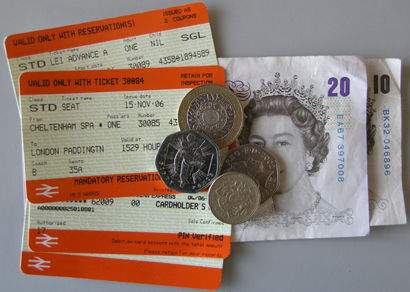THE latest inflation rate of 4.8 per cent could be set to trigger big rises in rail fares next January, but the watchdog Passenger Focus is urging train operators to be moderate.
The previous formula of Retail Price Index + 1% to calculate annual rail fare increases is under review in any case, with the transport secretary Philip Hammond refusing to rule out a rethink as the goverment struggles to balance its books.
The old formula produced some reductions in fares last January, because the inflation index a year ago was negative. Now the balance may swing in the other direction, with some sources claiming that rises of ten per cent are possible in the New Year.
However, the prospect of such increases is dismaying Passenger Focus.
PF rail director Ashwin Kumar said: “Passengers continue to tell us their top priority for improvement on the railway is better value for money.
“With the whole country feeling nervous about our economic prospects, passengers will expect train companies to show restraint next January. Now is not the time for train companies to sweat passengers off the train.”
The watchdog would also like to see a continuing limit on the flexibility train companies have to increase fares on individual routes.
“In the past, the average fare rise has masked increases on some routes of 10 or 11 per cent. We hope the Government continues to limit train companies’ flexibility so passengers on some routes don’t face double digit rises,” Mr Kumar said.
He concluded: “Our research has shown that passengers in Britain already pay some of the highest commuter fares in Europe. For example, an annual season ticket for a journey such as Warrington to Manchester costs 60% more than an equivalent journey into Paris. Just because you can increase fares, does not mean you should – this is a time for restraint.”
A similar call has come from the pressure group Campaign for Better Transport, whose director Stephen Joseph said: “We’re already facing the prospect of even more crowded trains and reduced services due to possible spending cuts – and now we could have to pay even more for a worse service. Above-inflation fare rises are bad for the economy, bad for the environment and a rotten deal for passengers. With fuel prices so high, we need to make sure that the train offers a realistic alternative to driving.
“There’s still time for the Government to honour its commitment to fair fares – but if the spending review doesn’t deliver on this promise, this could prove to be a flash-point for the Coalition. We aren’t going to let the Liberal Democrats forget their election promise to lower fares, and I don’t think hard-hit commuters in key marginal seats will either.”
In spite of these urgings, there's been little comfort as yet from the operators. Although the Association of Train Operating Companies said train companies understand that ‘these are tough times for many’, a spokesman for ATOC added: “The Government is currently reviewing its position, so we will need to wait and see what happens.
“With demand for rail travel expected to double within the next 20 to 30 years, it is vital to sustain investment and the money raised from fares will make a significant contribution to improving services for passengers.”


